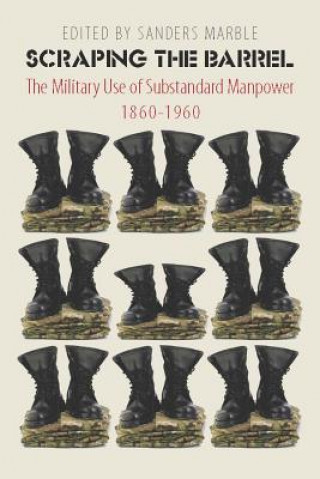
Kód: 04941196
Scraping the Barrel
Autor Sanders Marble
It is a truism that history is written by the victors, and perhaps doubly so of military history, where the tendency is to relate the biggest battles, the most victorious and heroic deeds, the very best (or worst) of men. This boo ... celý popis
- Jazyk:
 Angličtina
Angličtina - Vazba: Brožovaná
- Počet stran: 372
Nakladatelství: Fordham University Press, 2012
- Více informací o knize

1140 Kč

Skladem u dodavatele v malém množství
Odesíláme za 14-18 dnů
Potřebujete více kusů?Máte-li zájem o více kusů, prověřte, prosím, nejprve dostupnost titulu na naši zákaznické podpoře.
Přidat mezi přání
Mohlo by se vám také líbit
-

Eyelike Stickers: Baby Animals
149 Kč -

Phantoms in the Brain
357 Kč -

Writings of Carlos Fuentes
698 Kč -

Violence
1430 Kč -

American Lesson
561 Kč -

RHCSA Red Hat Enterprise Linux 9
1363 Kč -

Paral L Z U Importa Ierobe Ojumi Eiropas Savien B
1533 Kč
Dárkový poukaz: Radost zaručena
- Darujte poukaz v libovolné hodnotě a my se postaráme o zbytek.
- Poukaz se vztahuje na celou naši nabídku.
- Elektronický poukaz vytisknete z e-mailu a můžete ihned darovat.
- Platnost poukazu je 12 měsíců od data vystavení.
Více informací o knize Scraping the Barrel
Nákupem získáte 114 bodů
 Anotace knihy
Anotace knihy
It is a truism that history is written by the victors, and perhaps doubly so of military history, where the tendency is to relate the biggest battles, the most victorious and heroic deeds, the very best (or worst) of men. This book stands as a corrective to this belief. Scraping the Barrel covers ten cases of how armies have used sub-standard manpower in wars from 1860 to the 1960s. Dennis Showalter and Andre Lambelet look at the changing standards in Germany and France leading up to World War I, while Peter Simkins chronicles what happened with the 'Bantams,' special units of short men used by Britain in the Great War. Often the use of substandard men was to answer the sheer need for manpower in brutal, lasting conflicts, as Paul A. Cimbala writes of the U.S. Veteran Reserve Corps in the Civil War, or to keep war-damaged men active; sometimes this ethos was used to include men who wanted to fight but who otherwise would have been excluded, as Steven W. Short writes of the U.S. Colored troops in the First World War. In the Second World War it was to answer more dire exigencies, as David Glantz relates how the USSR, having suffered enormous losses, threw away many pre-war standards, reaching for women, ethnic/national minorities, and political prisoners alike to fill units. Likewise, Nazi Germany, facing many fronts and a finite manpower pool, was compelled to relax both physical and racial standards, and Walter Dunn and Valdis Lumans look at these changing policies as well as the battlefield performance of these men. In relating the stories of the sub-standard (for the military), Scraping the Barrel is also a humanist history of the military, of the more average men who have served their country and how they were put to use. It throws light on how militaries' ideas of fitness reflect the underlying views of their societies. The idea of "disability" has been constructed based on a variety of physical, yes, but also social standards: as a value judgment on groups viewed as lesser - the aged, the lower classes, and those of different races and ethnic identities. From the American Civil War, through World Wars I and II, through the U.S. Project 100,000 in the Cold War, sub-standard men have been mobilized, served, and fought for their countries. These men are the inverse of the elites that get the lion's share of our attention. This is their untold history.
 Parametry knihy
Parametry knihy
Zařazení knihy Knihy v angličtině Humanities History Regional & national history
1140 Kč
- Plný název: Scraping the Barrel
- Podnázev: The Military Use of Substandard Manpower, 1860-1960
- Autor: Sanders Marble
- Jazyk:
 Angličtina
Angličtina - Vazba: Brožovaná
- Počet stran: 372
- EAN: 9780823239788
- ISBN: 0823239780
- ID: 04941196
- Nakladatelství: Fordham University Press
- Hmotnost: 499 g
- Rozměry: 229 × 152 × 23 mm
- Datum vydání: 14. August 2012
Oblíbené z jiného soudku
-

Hundred Years' War on Palestine
338 Kč -

Ethnic Cleansing of Palestine
357 Kč -

History of Japan
405 Kč -

Ten Myths About Israel
336 Kč -

Strange Death of Europe
410 Kč -

Decline and Fall of the Roman Empire
195 Kč -

Secret History
303 Kč -

God's Playground A History of Poland
1700 Kč -

Mayflower
385 Kč -

How to be a Victorian
357 Kč -

Plantagenets
331 Kč -

General's Son
429 Kč -

Iran: A Very Short Introduction
225 Kč -

Temples of Karnak
3798 Kč -

Cuneiform
276 Kč -

Twenty Years A-Growing
250 Kč -

History of Witchcraft in England from 1558 to 1718
453 Kč -

China in Africa
894 Kč -

Islandman
250 Kč -

Bohemian Paris
414 Kč -

Alexiad
423 Kč -

Lancaster And York
388 Kč -

Inside Hitler's Greece
513 Kč -

Modern France: A Very Short Introduction
233 Kč -

Diana: Her True Story - In Her Own Words
306 Kč -

The Fourth Turning
441 Kč -

The Oxford History of Ancient Egypt
384 Kč -

Churchill: The Power of Words
410 Kč -

Palestine
534 Kč -

Korean History in Maps
706 Kč -

Great Gatsby (Wisehouse Classics Edition)
405 Kč -

Viking Way
1144 Kč -

The Thirteenth Tribe
308 Kč -

My Promised Land
517 Kč -

Vanished Kingdoms
514 Kč -

Age Of Revolution
410 Kč -

Life and Death of Anne Boleyn
624 Kč -

Coming of the Third Reich
464 Kč -

Children of Ash and Elm
462 Kč -

Europe Between the Oceans
798 Kč -

Socialism Betrayed
475 Kč -

303 Squadron
464 Kč -

Ancient Celts, Second Edition
624 Kč -

Dancing in the Glory of Monsters
395 Kč -

Battle of Britain: Luftwaffe Blitz (Images of War)
606 Kč -

Age of Confucian Rule
851 Kč -

Beyond Band of Brothers
410 Kč -

Benjamin Franklin
410 Kč -

On China
462 Kč
Osobní odběr Praha, Brno a 12903 dalších
Copyright ©2008-24 nejlevnejsi-knihy.cz Všechna práva vyhrazenaSoukromíCookies


 Vrácení do měsíce
Vrácení do měsíce 571 999 099 (8-15.30h)
571 999 099 (8-15.30h)